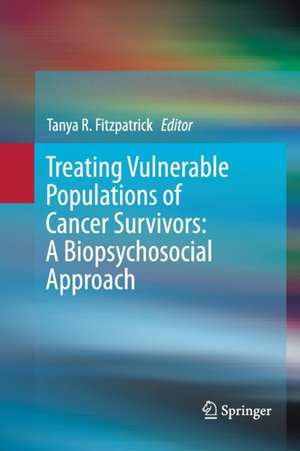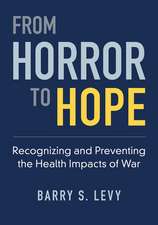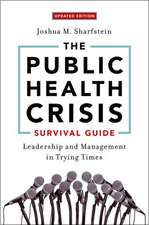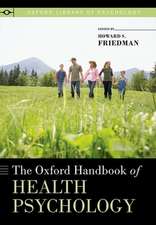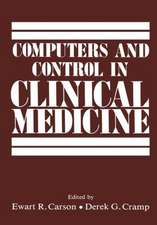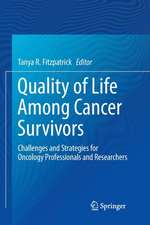Treating Vulnerable Populations of Cancer Survivors: A Biopsychosocial Approach
Editat de Tanya R. Fitzpatricken Limba Engleză Paperback – 30 mai 2018
- Providing psychosocial distress screening, coping resources and self-care to newly diagnosed cancer survivors.
- Latino cancer survivors: the old and the young.
- An exploration of Latvian immigrants' cancer experience and implications for supportive interventions.
- Survivorship issues among Muslim women with cancer.
- How art therapy can benefit the quality of life of young breast cancer survivors.
- The family caregiver as cancer survivor: supporting and promoting positive bereavement outcomes.
| Toate formatele și edițiile | Preț | Express |
|---|---|---|
| Paperback (1) | 362.37 lei 6-8 săpt. | |
| Springer International Publishing – 30 mai 2018 | 362.37 lei 6-8 săpt. | |
| Hardback (1) | 369.10 lei 6-8 săpt. | |
| Springer International Publishing – 6 iun 2016 | 369.10 lei 6-8 săpt. |
Preț: 362.37 lei
Preț vechi: 381.43 lei
-5% Nou
Puncte Express: 544
Preț estimativ în valută:
69.36€ • 72.13$ • 58.12£
69.36€ • 72.13$ • 58.12£
Carte tipărită la comandă
Livrare economică 14-28 martie
Preluare comenzi: 021 569.72.76
Specificații
ISBN-13: 9783319812670
ISBN-10: 331981267X
Ilustrații: XV, 160 p. 4 illus.
Dimensiuni: 155 x 235 mm
Greutate: 0.26 kg
Ediția:Softcover reprint of the original 1st ed. 2016
Editura: Springer International Publishing
Colecția Springer
Locul publicării:Cham, Switzerland
ISBN-10: 331981267X
Ilustrații: XV, 160 p. 4 illus.
Dimensiuni: 155 x 235 mm
Greutate: 0.26 kg
Ediția:Softcover reprint of the original 1st ed. 2016
Editura: Springer International Publishing
Colecția Springer
Locul publicării:Cham, Switzerland
Cuprins
Culture-specific theoretical and conceptual models addressing vulnerable populations.- Providing psychosocial distress screening, coping resources, and self-care to older cancer survivors in a Canadian small-town setting.- Therapeutic interventions, social and health issues among elderly Latino cancer survivors.- Family and community interventions: the experience of Latvian immigrant cancer survivors in Canada.- Cancer survivorship issues among Muslim women with cancer.- Exploring the artist’s book: how art therapy can enhance quality of life of young breast cancer survivors.- Physical activity, locus of control, and fear of recurrence among young and older cancer survivors from a community cancer support center.- Therapy-related interventions, dental health issues, and the impact on quality of life among pediatric cancer survivors.- Health and social issues among esophagogastric cancer survivors: the STOP Cancer Initiative.- The caregiver as survivor: Caregiver support initiatives, person-centered approaches, and quality of life for the caregiver and family members. – Conclusion
Notă biografică
Tanya Fitzpatrick, Ph.D., MSW, RN received her doctoral degree in social work from Boston College in 1992 and completed post-doctoral studies through Boston University focusing on issues relating to health and social outcomes among older adults. She was recently appointed the director of research at Hope & Cope (H&C), the Jewish General Hospital (JGH), with an appointment at McGill University since her employment in 2009 through January 2014. Prior to her employment at McGill, she was an associate professor from 2000 until 2008, and is professor emeritus from Arizona State University, Department of Social Work, with a background in nursing, social work, and gerontology. She is a member of the Gerontological Society of America, Society for Social Work Research, National Association of Social Workers, Canadian Association of Psychosocial Oncology, and American Society on Aging.
Textul de pe ultima copertă
This competence-building resource synthesizes a rich trove of conceptual and practical information on treating cancer survivors at risk of being underserved. Spotlighting a diverse group of ethnic and other demographic populations surviving diverse forms of cancer, the book models the assessing of needs and the developing of strategies to meet them. The multiple burden of cancer—medical and psychosocial problems, discrimination and stigma, quality of life issues—is described in depth as it affects different cultural and age populations. Contributors also present interventions that effectively and meaningfully address these complex intersections of physical, emotional, interpersonal, and layered social concerns.
Included among the topics:
Included among the topics:
- Providing psychosocial distress screening, coping resources and self-care to newly diagnosed cancer survivors.
- Latino cancer survivors: the old and the young.
- "immigrants'="" cancer="" experience="" and="" implications="" for="" supportive="" interventions.<
- Survivorship issues among Muslim women with cancer.
- How art therapy can benefit the quality of life of young breast cancer survivors.
- The family caregiver as cancer survivor: supporting and promoting positive bereavement outcomes.
Caracteristici
Offers interventions for enhancing the QOL of vulnerable survivor populations Teaches cultural competence in addressing racial, ethnic, and age disparities Written from a social work and nursing perspective Includes supplementary material: sn.pub/extras
